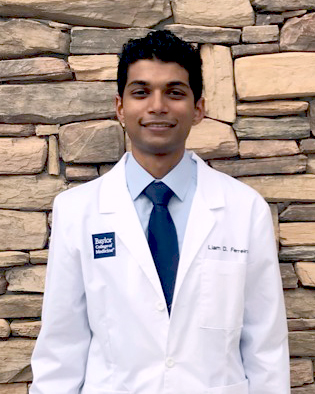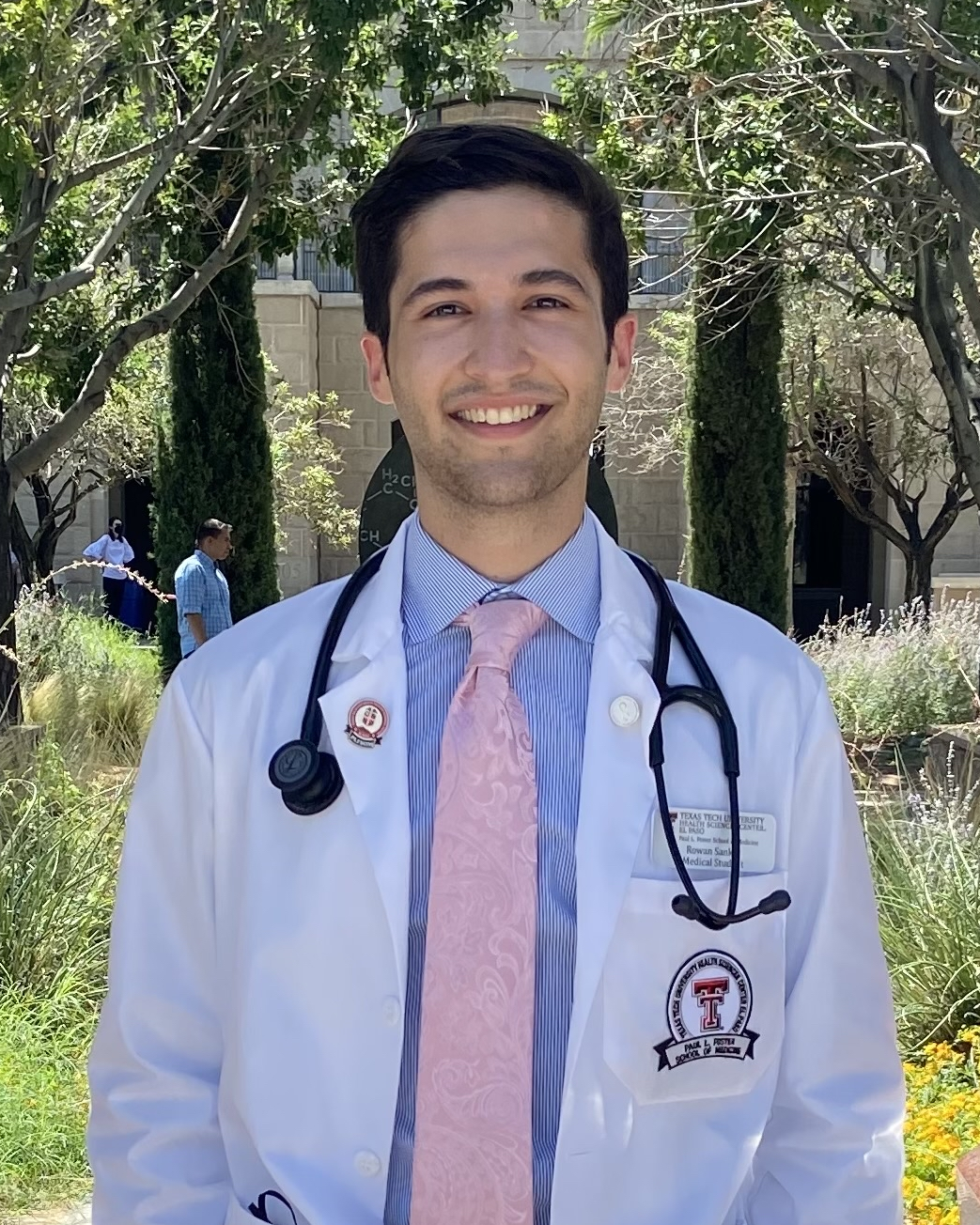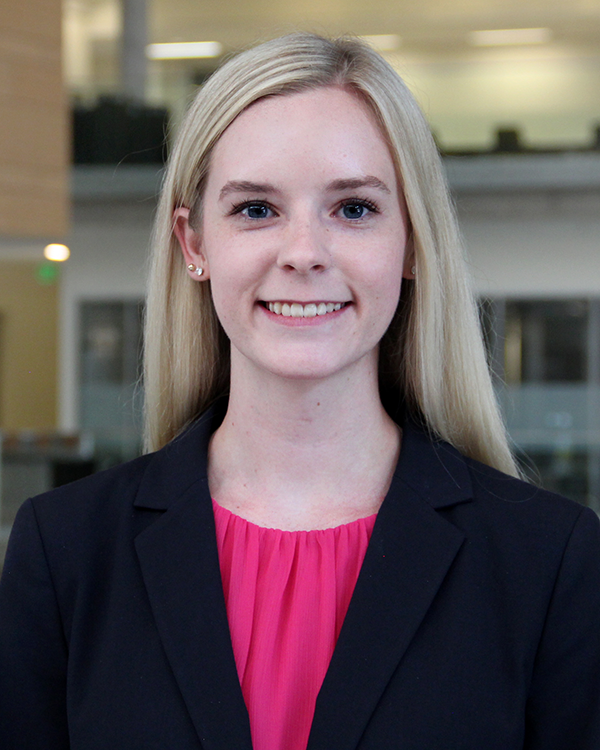Robbins Healthcare MBA Gives Future Medical Students a Competitive Edge

Baylor's Healthcare MBA offers a Pre-Clinical Track degree plan that shortens the road to impact in a clinical setting.
The road to becoming a physician is famously long and winding, with plenty of unexpected stops and detours along the way. For aspiring medical students at Baylor, the Pre-Clinical Track degree plan is one of the most strategic detours they can take.
At Baylor's Hankamer School of Business, the Pre-Clinical Track degree plan—offered through the Robbins Institute for Health Policy and Leadership—gives undergraduate students the opportunity to earn a Healthcare MBA in only 12 months before continuing on to medical school.
Filling in the Gaps
Liam Ferreira, who graduated from Baylor with a bachelor's degree in biology, opted to pursue his MBA at the Hankamer School of Business before attending the Baylor College of Medicine. "When you begin to shadow physicians and gain more experience in healthcare, you notice a gap between the business and clinical aspects of the industry," he said. With the encouragement of several clinicians he shadowed, Ferreira enrolled in the Healthcare MBA program to gain a richer perspective of the business side of healthcare operations, or the "suits" that make clinical work possible.

Liam Ferreira Baylor MBA PCT Alum
Another alumnus, Rowan Sankar, was determined to pursue a career in medicine even before he enrolled in Baylor's undergraduate neuroscience program. "My mom passed away when I was young," he said. "Watching how well her doctors treated me and my dad was a powerful thing for me. I wanted to be that for other people."
Like many students, Sankar did not get accepted into medical school the first time he applied, so he began searching for opportunities to strengthen his application. He went to work as a medical scribe at a small orthopedic surgery clinic, which exposed him to the realities of running a small business while offering clinical care. At the same time, he gained firsthand knowledge of the dynamics involved in healthcare economics when he witnessed patients with debilitating injuries who were unable to receive coverage for surgery.
"It was a desire to improve healthcare affordability, as well as build a foundation to open my own orthopedic practice someday, that swayed my decision to pursue an MBA," he said.

Rowan Sankar Baylor MBA PCT Alum
Stephanie Dodgen, another student enrolled in the Pre-Clinical Track degree plan, had shadowed enough physicians during her undergraduate years to know that her passion lay in pediatrics. But she was not confident that she would gain acceptance into medical school, so she chose to take a gap year. "I wanted a degree that would benefit me no matter where I ended up, so I began exploring MBA options," she said. "I took a tour of Baylor's campus with Colonel Garner, one of the Healthcare MBA instructors, which opened my eyes to the doors that this degree could open."
Shifting Gears
These three students, none of whom had taken any business classes in their undergraduate years, faced a steep learning curve upon entering the Healthcare MBA program. As an undergraduate student at Southern Methodist University, Dodgen majored in biology and music. "Music is music, and science is science," she said. "None of it prepared me to learn marketing, finance or accounting. It was all new material."
Ferreira and Sankar echoed her thoughts, pointing to the high volume of deliverables in unfamiliar subjects. "I realized later that this experience was similar to medical school in that we had to develop a consistent, dedicated approach to our studies," Ferreira said. "We were taking on a new project or paper nearly every day."
They give credit to their cohort, in large part, for making the experience successful. "In a very short time, I got to know my classmates better than I knew most of my undergrad cohort," Sankar said. "I learned how to network and how to work effectively in a group to achieve a common goal." Dodgen agreed, describing the 20-person Healthcare Administration cohort as a "close, tight-knit group of people" from a wide variety of backgrounds. She also affirmed the dedication of the three primary instructors in the Healthcare MBA program—Colonel Scott Garner, Cherise Bridgwater and Forest Kim—to helping students stay afloat. "It was evident from the first day in the program that they care deeply about our success," she said.
Taking the Next Step
While Dodgen was accepted into medical school, her experience as an MBA student inspired her to take her career in a different direction. "I had decided to become a pediatrician before I knew about other roles that existed in the healthcare industry," she said. Rather than commit to another seven years or more of clinical training, she decided to pursue a path she came to find equally attractive: the role of a hospital administrator.

Stephanie Dodgen Baylor MBA HCA Candidate
Fortunately, switching from the Pre-Clinical Track degree plan to the standard Healthcare MBA did not require her to extend her time in the program for more than a year. Thanks to the program's robust placement system, she recently landed a residency position at the Delray Medical Center in Florida, where she will spend nine months honing her operations skills before completing a capstone course and graduating in 2023.
"Nothing has been wasted," she said. "I never thought I would end up here, but the Healthcare MBA program opened my eyes to how much opportunity exists in the healthcare space. There are so many avenues for impact."
For Ferreira and Sankar, a Healthcare MBA from Baylor provided a significant advantage as they transitioned into medical school. Ferreira thoroughly embraced courses in strategy, healthcare policy and information systems in his journey to become a well-rounded clinician. To put his newfound knowledge into action, he participated in several case competitions and a writing competition in his spare time.
"Without these classes and competitions, I would not have had the opportunity to learn so much about emerging technologies that are changing healthcare, or about the complexity involved in moving to value-based care," he said.
After graduating from the Baylor College of Medicine, Ferreira aspires to become a leader within a healthcare organization. "Having an MBA signals that I have business acumen as well as clinical expertise," he affirmed. "When an opportunity to fill an executive role comes along, I will be ready."
For Sankar, the passion for healthcare policy that took root in the clinic where he worked as a medical scribe has blossomed over time. "During my MBA, I really dove headfirst into the area of health economics, zooming in on the structure and shortcomings of the U.S. health marketplace and developing ideas for making it better," he said.
After finishing his Healthcare MBA, Sankar received a large scholarship to attend medical school at Texas Tech University Health Sciences Center El Paso. In a city with a relatively high incidence of health disparities, he feels more equipped to address these disparities in an informed, meaningful way.
"As one of only three students in my class with an MBA, I have a unique perspective to offer," he said. "I had a desire to shape healthcare reform before the MBA program, but now I have an actual leg to stand on."
What's Next
Are you interested in earning a Healthcare MBA before going to medical school? Click here to learn more about Baylor's 12-month Pre-Clinical Track degree or fill out the form below to speak directly with an admissions advisor.
About The Robbins Institute for Health Policy and Leadership
The Robbins Institute for Health Policy and Leadership was formally established by the Baylor Board of Regents in May 2011. The generous gift from Bill and Mary Jo Robbins of Houston, Texas, that created the Institute within the Hankamer School of Business provides the financial foundation to support efforts to make major contributions in health services research and education in the United States and around the world.
The Robbins Institute engages an interdisciplinary group of scholars in a wide variety of intellectual activities, including teaching, external programming and health services research. The institute is committed to providing quality academic training, while expanding a commitment to health services research on issues that directly impact the lives of millions of people worldwide.